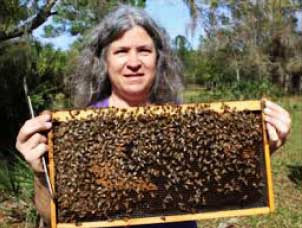LOCAL bee keepers recently got immersed in an interactive weeklong programme with the aim of increasing honey production on the island.
Over the past months, local retailers and consumers have been complaining of a shortage of honey for consumption and the issue has necessitated crucial review of this much needed commodity. The honey product is also considered highly as a healthy food alternative to the raw sugar.

Consequently, the 10th Caribbean Beekeeping Congress got underway in Saint Lucia on November, 24. And while the weeklong Congress was being held virtually there were also a few activities taking place on the ground.
The congress ran from November 22 to 27 with participation from enthusiastic local farmers and programme facilitators.
The opening session focused on rearing of Queen Bees – that is the production of Queen Bees for the creation of additional colonies and consequently, increased production of honey.
Day one of the 10th Caribbean Beekeeping Congress was held at Vigie, at the site of an eco-tourism project that involves beekeeping.
Informative sessions conducted by John Frederick – the Vice President of the Iyanola Apiculture Collective provided experienced and novice beekeepers with an opportunity to learn about Queen Rearing.
Said Frederick: “Queen rearing allows you to be able to mass produce hives. And so if you have a colony that already has an existing queen and you want to make a new colony …you simply take those bees from that colony and put it into a separate box and a new queen to that separate box, and now you start with two hives.”
A participant noted that the objective of this programme was to look for productive hives that are producing honey and thus, graft from these hives so they can produce better queens.
Another farmer commented that, “Queen rearing is important to jump start the sector and therefore increase (production) in a short space of time.”
Queen rearing is regarded as a critical component for increasing honey production and for the perpetuation of healthy and vibrant hives.
As part of the weeklong programme of activities, a workshop session was held and this generated more public interest in beekeeping and in assuring potential beekeepers of the availability of the most productive queens and colonies.
“First of all we have to look at the quality as a breeder, and to give the characteristics that you look forward to. And especially, with most of our bee keepers to increase their production is the main indicator for the quality of that breed,” said the farmer.
Frederick added: “The bee keeper wants to maintain a genetic and …so he can mass produce in his hives that he will be satisfied with.”
A field trip to Des Barras was also part of the programme – where apiculture is being practiced by young beekeepers. They were trained by the Iyanola Apiculture Collective and are now in the commercial production of honey.
The 10th Caribbean Beekeeping Congress continued with further interaction and knowledge sharing at the Orchid Centre in Union.










![.[L-R] Parliamentary Representative for Castries Southeast, Lisa Jawahir & Talk show host, Timothy Poleon](https://thevoiceslu.com/wp-content/uploads/2026/02/Lisa-Jawahir-Timothy-Poleon-380x250.jpg)
![Public Service and Utilities Minister Stephenson King delivered remarks [Photo credit: VP]](https://thevoiceslu.com/wp-content/uploads/2026/02/Stephenson-King-380x250.jpg)

